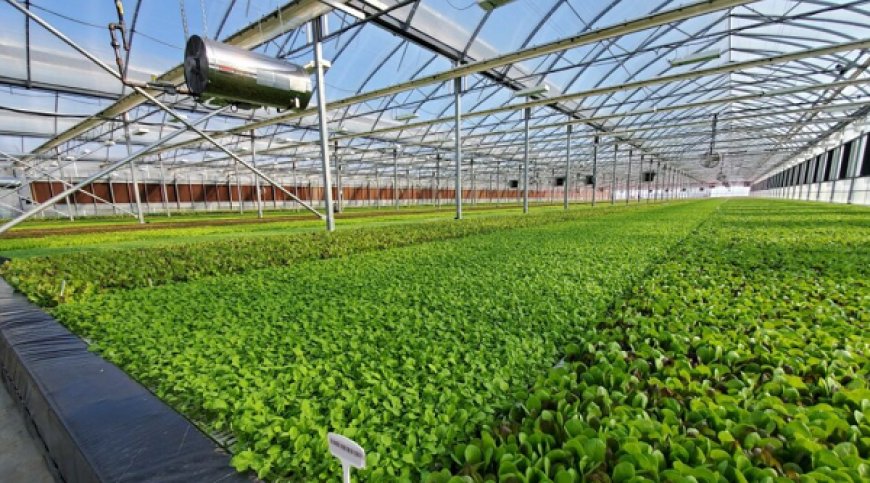Mechanised farming will boost food production, job creation, say experts

Experts have emphasised the importance of mechanised farming as a way of boosting food production and job creation.
They spoke on the need for the African countries to reaffirm their commitment on food security, job creation through sustained agricultural mechanisation and innovation.
Speaking during the presentation of a book titled: How Africa Eat authored by Professor David Luke of the London School of Economics and Professor Olawale Ogunkola of the University of Ibadan. Ogunkola said while mechanisation reduces manual labour requirements, it does not necessarily lead to job losses.
He said diversification could help to reduce unemployment, particularly in rural areas, and contribute to the economic development of local communities.
He said: “Instead, it creates a demand for a different set of skills related to operating, maintaining, and repairing agricultural machinery. This shift presents an opportunity for job creation, as individuals will need to be trained in the technical aspects of modern farming equipment”.
Using Nigeria as example, Ogunkola said one thing is to have a good policy, another thing is to carry out the implementation.
“That is why we have agencies such as Bank of Industry(BOI) and Bank of Agriculture(BOA). They will all the good plans but implementing them becomes a big problem.”
He said solving Africa’s food crisis is a matter of political will and government priorities.“If we decide today that we are not going to import food for our people and we invest in agriculture, farmers are not asking for money. They are asking you to address the basic problems; rural infrastructure, transportation of products, and assistance during crises.”
Ogunkola stressed that while Africa possesses abundant arable land and human capacity, achieving food security will depend on how effectively the continent mobilizes domestic finance, strengthens agricultural policies, and invests in modern infrastructure to support production and distribution.
Professor Luke said despite several continental frameworks designed to boost agricultural productivity, most African countries have failed to meet agreed investment targets.
He cited the African Union’s Comprehensive African Agricultural Development Programme (CAADP), which mandates member states to allocate at least 10 per cent of their annual budgets to the agricultural sector, as an example of a commitment that has largely been ignored.
“What we found is that only a few countries have ever reached that target. And when it comes to private investment, African banks are not really lending to agriculture. We found that bank rates are high. Because of our land tenure system, the communal holding of farmland cannot really be used as collateral for banks,” Luke stated.
He explained that while microcredit schemes exist, they often fail to support production at scale. He said foreign direct investment and donor aid to agriculture remain very low.Luke also blamed unfair competition and heavy subsidies in developed countries for worsening the continent’s food crisis.
“Each country is able to subsidize their agriculture. So for some specific products like rice, maize, wheat, livestock, meat, poultry, and fish, we find that each country is able to subsidize these things, so we cannot produce them competitively,” he said.
Beyond funding challenges, the study highlights the growing impact of climate change on food systems in Africa. Luke noted that farmers across the continent are increasingly facing droughts, floods, and locust invasions that disrupt production.
“The way that we see climate change manifesting itself is the high frequency of extreme weather events. It impacts farmers’ production, but the good thing is that a lot is being done on adaptation, though not well funded.”
According to him, there are encouraging innovations across Africa in areas such as irrigation, soil management, and the development of climate-resilient seed varieties. However, these efforts are undermined by a severe lack of financial support.
On what actions African leaders must prioritize to end hunger, Luke identified access to finance as the most critical step.
“I would say, in fact, the two top actions should be finance. Africa is not poor. Neither are we poor when it comes to arable land. The point is, we have not yet figured out how to use our financial systems, banks, pension funds, and others to support agricultural development.”
Luke said that part of the problem lies in risk perception among lenders, as communal land ownership prevents farmers from using farmland as collateral. “But in other countries, they have been able to overcome these sorts of issues,” he noted, citing Kenya as an example with specialized agricultural development banks. “You cannot treat agriculture like any other economic activity. It is so vital. Agriculture can be a powerful driver of economic development for jobs, etc.”
Luke said the book, How Africa Eats, focuses on three key themes namely trade, agricultural financing, and climate, and argues that Africa’s export-driven model, which prioritizes raw commodities over value addition, has kept incomes low and poverty high. “We are exporting commodities, we are not adding value, so we are not getting the value. When you have high poverty, people literally don’t have enough to have good nutrition,” he said.
Lennart Oestergaard, Resident Representative of Friedrich-Ebert-Stiftung (FES) Nigeria, who partnered in the research dissemination, said increased food production stabilises prices and enhances the affordability of basic commodities.
He said the study exposes how Africa’s dependence on raw commodity exports has worsened hunger and poverty across the continent.
He noted that countries like Nigeria have continued to rely heavily on the export of unprocessed commodities instead of adding value locally.
He said that the research would help spur relevant stakeholders to take actions in addressing some of the key issues identified.
Mechanised farming will boost food production, job creation, say experts - The Nation Newspaper









